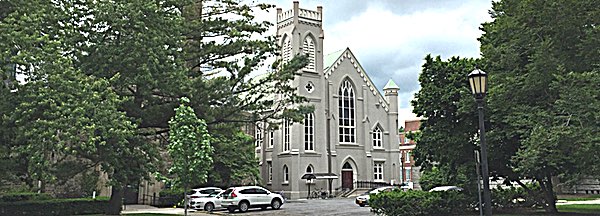- By Marcia E. Lynch
- News
 Print
Print 
Governor Andrew M. Cuomo recognized Tompkins County and the town of Ithaca as New York's 12th and 14th local governments to be designated as Certified Climate Smart Communities. Actions to strengthen resiliency and reduce greenhouse gas emissions in these communities support the Governor's aggressive goals to reduce statewide emissions 40 percent by 2030.
"New York continues to make significant strides in reducing greenhouse gas emissions, and by joining forces with communities across the state and the nation, we are combatting climate change to provide a more sustainable environment for future generations of New Yorkers," Governor Cuomo said. "I commend Tompkins County and the town of Ithaca for supporting these clean energy initiatives, and I encourage municipalities across New York to follow their lead and become Certified Climate Smart Communities."
At an event held at the Tompkins County Recycling and Solid Waste Center in Ithaca, Michael Lane, Chair of the Tompkins County Legislature, and Bill Goodman, town of Ithaca Supervisor, were presented street signs highlighting their achievement of certification. The center is the future location of a new food scraps recycling project funded by the State's Climate Smart Communities Grant Program.
Tompkins County Between 2008 and 2014, Tompkins County reduced its local government greenhouse gas emissions by an impressive 53 percent. During that same period, community emissions were reduced by 21 percent. These reductions are the result of building partnerships, establishing a rigorous system to track greenhouse gas emissions, set targets, and taking systematic steps to reduce emissions.
The county's climate action program also emphasizes adaptation through initiatives such as preserving natural areas for ecosystem resiliency and incorporating climate change concerns into a multi-hazard mitigation plan. The town of Ithaca and Tompkins County have worked closely together since 2006 to develop a hazard mitigation plan that addresses the risks posed by climate change. All residents of Tompkins County and its infrastructure will be more resilient to a changing climate thanks to the depth and scope of collaborative local adaptation planning.
In addition to becoming a Certified Climate Smart Community, Tompkins County recently received funding for two projects from DEC's Climate Smart Communities Grant Program through the Environmental Protection Fund: $25,000: The County received rebates totaling $25,000 under the Municipal Zero-Emission Vehicle Rebate Program for five plug-in hybrid electric vehicles. The cost of procuring the vehicles was further reduced by participation in the New York State aggregate purchase program, which is sponsored jointly by DEC and the Office of General Services. $355,000: This grant will help Tompkins County reduce greenhouse gas emissions from food waste by establishing a centralized transfer station that accepts food scraps at its Recycling and Solid Waste Center. The grant will support the replacement of an existing storage building with a new specialized tipping pad designed to accept food waste.
More information about DEC's Climate Smart Communities Grant Program and Municipal Zero-Emission Vehicle Rebate Program is available here.
In April, Tompkins County became the first community in the Southern Tier to be designed a Clean Energy Community by the New York State Energy Research and Development Authority, highlighting its leadership in reducing energy use, cutting costs, and driving clean energy in its communities. The designation gives Tompkins County an opportunity to apply for up to $250,000 toward additional clean energy projects, with no local cost share.
Town of Ithaca The town of Ithaca earned its certification by implementing each of the Climate Smart Community Pledge Elements through a well-rounded, comprehensive local climate action program that embraces both mitigation and adaptation. Ithaca has completed greenhouse gas emissions inventories for both municipal operations and the broader community, and has integrated sustainability – and a chapter dedicated to climate and energy – into its Comprehensive Plan. The town has also implemented adaptation actions that include protecting riparian buffers through a stream setback ordinance in its zoning code. Under the Climate Smart Community Certification system, the town showed its innovation and leadership in the unique Residential Energy Score Project, which aims to create energy scores for homes that will provide the housing market with a clear signal regarding the value of energy efficiency. RESP was made possible with support from NYSERDA.
The town also recently kicked off the Green Building Policy Project, which is studying energy and sustainability standards for new construction and ways the town and city of Ithaca could incentivize or mandate those standards.
To improve municipal operations, the town of Ithaca performed building energy audits and lighting upgrades, started transitioning fleet vehicles to hybrids, and provides composting in municipal buildings. In 2014 and 2015, the town purchased enough Green-e certified renewable energy credits to offset 100 percent of its electricity use in municipal facilities and infrastructure. As a result, about 68 percent of the total energy used in all town facilities came from renewable sources. With commitments like these, the town of Ithaca is well on its way to achieving its goal of reducing greenhouse gas emissions from government operations 30 percent by 2020.
v13i25



